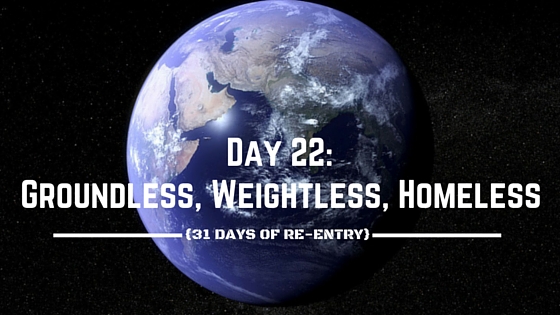During one of my trips back to America while I was living in China, I remember bemoaning to a mentor of mine about being single. She comforted me with the statement, “You have a higher calling.”
You mean I have a more important call than my friend living back in America with three kids? I thought.
“You have a higher calling.”
“You are DOING IT–you are going!”
“Be radical and sold out for Jesus!”
“Do big things for God.”
“I could never do what you do.”
“God has called YOU!”
It is statements like these that make it so difficult to return from the mission field to the humdrum life where you blend in with everyone else–and instead pursue a “lower calling.”
Growing up in the church, youth group, summer camps and Christian college, I had never really noticed these appeals to our pride until a few years ago. Our first year of marriage, my husband and I led a team of college students back to China with the organization I had been with. We had a week of training, complete with all the inspiring sermons, small groups, emotional praise and worship, prayer and individual devotionals I had been used to all my life. Not having grown up in the church, my husband would point out aspects of the messages I had never noticed before and how missions was made out to be the end-all, the only option for any Christian who was truly “sold out for Christ.”
An actor by trade, he actually saw many parallels between this group and all his acting teachers, who also considered the art to be a “calling.”
I was called to missions, but my husband was called to acting. Doctors feel called to save people. Artists are called to their particular art form–to dance, paint, sing, sculpt, compose or photograph. And the expectation is that you are either all in, or you are a sell out. Calling is not just a Christian term, it is a human term for people who are searching for purpose and meaning in life.
A quick Google search will lead you to articles such as: “10 Ways to Determine God’s Calling in Your Life,” “Find Your Calling: 5 Steps to Identify Your Purpose,” “4 Steps to Finding Your Calling,” “10 Signs you Found Your Calling,” and “Oprah On Finding Your Calling–What I Know for Sure.” It is not just Christians who want to make a difference in the world.
In February of 2015, in an article in the Wall Street Journal titled “I Don’t Have a Job. I Have a Higher Calling,” one researcher noted that “those who can connect their work to a higher purpose—whether they are a janitor or a banker—tend to be more satisfied with their jobs, put in longer hours and rack up fewer absences.” God has put eternity in the hearts of man (Eccl. 3:11) and placed a desire to live for something or someone greater than ourselves within each of us.
The Purpose Driven Life, by Rick Warren, has sold over 32 million copies world-wide for a reason. We want to have purpose. “What is your calling?” is a common question in Bible studies and small groups that assumes that each person has a unique and purposeful calling from God, though the “call to missions” seems to be the golden badge while the others are silver and copper.
Karen Yates puts it like this in her article “Your Calling is Closer Than You Think,” “We have an expectation that our calling is discoverable. It’s the gold nugget buried within the river bank. Search for it, be patient, don’t give up, we’ll find it (or stumble upon it) one day, eventually, and our lives will never be the same.”
When I answered the call to missions, I thought that it was an “all-in or all-out” situation. I felt sure God wouldn’t call me to do something halfway, so I threw myself completely into my work overseas. As mentioned in previous posts, God’s will for me turned out to be very different than I’d planned and I was heartbroken when I began to realize that I was going to have to be in the “all-out” camp of “less-than” Christians.
Missions, as it turns out, was a call on my life, but not the call. My call was first and foremost to intimacy with Jesus Christ.
I had left my first love to serve at the altar of my usefulness and worshipped what I could do for Christ rather than what He had already done for me. I had made my call to missions my idol, tightly winding my identity all around it, so that when I returned home I unraveled. I had no idea who I was anymore if I wasn’t “Someone’s friend or sister or daughter who is giving up everything to serve God in China.” I was just me again–Leslie without the “higher calling.” Leslie who lives in Chicago. Leslie the teacher. Leslie the wife.”
Like Gollum in The Lord of the Rings, my calling had become my precious ring I clung to for security and significance. It took leaving, getting married and reentering American life to pry my fingers off of what had started out good, but had slowly become something I worshipped. God had always only wanted me to hold it with open hands.
Karen Yates remarks, “The problem I see with that over-used, over-emphasized, over-preached word “calling” is that many of us have limited the definition of “calling” to a profession, a career or a role. In this view, calling is about what we do, not about who we are. Calling becomes about assignment—my calling to be a mother, or a psychologist, or a missionary, or a teacher; my “calling” to “go into ministry” or “go on the mission field.” And then when our children walk out the door, when we lose our jobs, when our spouses suddenly die, when the funding doesn’t come in, when we become desensitized with our workplace, or when we simply grow old and hunched over, what then? Where is our calling?” (Yates, “Your Calling is Closer than You Think”)
I do still believe God calls us to specific work at specific times. Sometimes it is through a burning bush moment, but often it is walking through one open door in obedience, then the next, then the next until we find that we are somewhere very different than where we started. And I do think that telling the nations about Christ is a privilege and a joy that is very different from other callings. But we need to be careful with the superlatives, lest we throw ourselves wholeheartedly at the altar of our call instead of at the altar of our Savior.
What other phrases does the church use to inspire us to go instead of remind us who we are in Christ? Have you ever struggled with this issue of calling? What have you learned over the years?
Sign Up for My Mid-Month Digest and Monthly Secret Newsletter Here:
Related Articles:
“Your Calling is Closer than You Think,” by Karen Yates, Relevant Magazine, May 28, 2013.
“The Idolatry of Missions,” by Jonathan Trotter, A Life Overseas, Nov. 9, 2014.
“Farewell to the Missionary Hero,” by Amy Peterson, Christianity Today, Sept. 14, 2015.
“I Don’t Have a Job. I Have a Calling.” by Rachel Feintzeig, The Wall Street Journal, Feb. 24, 2015.
This post is day 17 of the series “Re-entry: Reflections on Reverse Culture Shock,” a challenge I have taken to write for 31 days during the month of October. Check out my other posts in this series:
Day 1: Introduction
Day 2: Grieving
Day 3: No One Is Special
Day 4: Wasted Gifts
Day 5: I Never Expected…
Day 6: Identity: Through the Looking Glass
Day 7: Did I mishear God?
Day 8: When You Feel Like Shutting Down
Day 9: Caring for your Dorothy
Day 10: You’re Not the Only One Who’s Changed
Day 11: 12 Race Day Lessons for Serving Overseas
Day 12: Confessions of an Experience Junkie
Day 13: Longing for Home
Day 14: Readjusting: Same Tools, Different Work Space
Day 15: Book Review: The Art of Coming Home
Day 16: The Story of My “Call”
Day 17: Is Missions a “Higher Calling”?
Day 18: And Then I Fell in Love
Day 19: Is God Calling You Overseas?
Day 20: Life Is Not Seasonal
Day 21: What I Took and What I Left Behind
Day 22: Groundless, Weightless, Homeless
Day 23: When the Nations Come to You
Day 24: The Call to Displacement
Day 25: Scripture Anchors for Re-Entry
Day 26: In the Place of Your Exile
Day 27: Resources for Re-entry
Day 28: A Time for Everything: A Prayer of Leaving
Day 29: Journal: 8 Months After Re-Entry
Day 30: 12 Survival Tips for Re-Entry
Day 31: A Blessing
(Day 32: Writing is Narcissistic (And Four Other Reasons Not to Write)–a reflection on this Write 31 Days experience)
Linking up with Literacy Musing Mondays
and Taking Route











